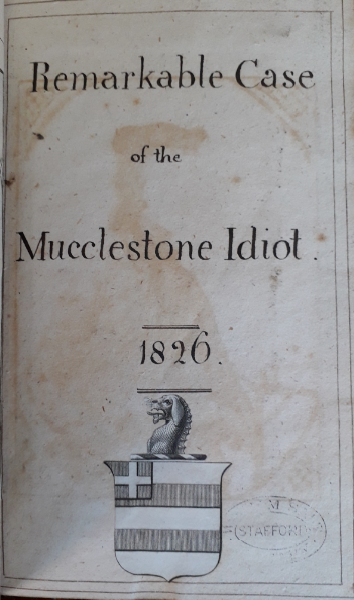By Lucy Smith

In January 1826 John Garrett, Superintendent of the Stafford Asylum, encountered a shocking case of neglect which caused public outrage and exposed the lack of legal protection for vulnerable adults at this time.
George Smith was 47 years old and had been born with a learning disability. He was the son of a well-to-do local farmer who had died in 1812, leaving £1,400 for George’s care. Rumours concerning George’s welfare prompted local magistrates Thomas Eld Esq and Rev Broughton to visit the family farmhouse with a constable, where they asked to see George. His brother and sister at first refused, but the men insisted and went upstairs where they discovered a door with a lock and chain. Opening it, they were overcome by the smell of human waste but could see nothing, the window having been closed-up with bricks. As Mr Eld began to pull the bricks out of the window in order to let in some light, they saw George lying on a bedstead on bare boards covered with chaff. He was emaciated, naked, filthy and ‘curled up like a greyhound’ in an attempt to keep warm, with only an old coat and sacks as bedding. Rev Broughton would later tell the court of his outrage at hearing George’s sister, dressed in silk, inform him that her brother had lain for fourteen years in this state, with no medical attention for at least eight years.

The asylum admission notes convey very clearly Garrett’s anger at the situation (the term ‘friends’ here refers to relatives):
‘the friends (if they can be so called) consenting (probably from fear of the consequences) to his removal to the asylum, he has been this day removed here under the Rev Broughton’s directions’.
George was taken to the asylum in a post-chaise, accompanied by Mr Garrett and Mr Eld, where he was given a warm bath twice a day for several days to ease his limbs, since his thigh and knee joints were permanently contracted from having sat on his haunches for many years. He was very timid and would only take his food in bed during the night. Closer examination revealed an old injury, a possible fracture of the thigh, which had been left untreated, with one leg now being four inches shorter than the other. Unfortunately, the move initially exacerbated the injury and George’s condition worsened, but as his appetite increased he was put on a ‘nutritive and rather generous diet’ with ‘two glasses of wine daily’ and his health slowly improved.
The Stafford Magistrates and Visiting Committee of the Asylum took steps ‘for the prosecution and punishment of the individuals’ by whom George had been ‘so cruelly and inhumanly treated’. On 8 February, the Salopian Journal published an article about the case which soon appeared in other newspapers around the country; the family immediately began libel proceedings against them. The King v Smith was heard in Gloucester because it was felt that the adverse publicity had jeopardised all chances of a fair trial in Stafford. The court was told that it had been his father’s wish that George should not enter an asylum. It was claimed that George had never been able to walk or talk and had always been well cared for by his sister, that he usually slept in sheets on a feather bed which was being cleaned at the time of the visit, that the room was kept dark because the light caused epileptic fits, the fire was not lit for fear he would fall into it and that George refused to bathe or shave and tore off his clothes.
Evidence against the Smiths included that of Thomas Bakewell, proprietor of Spring Vale, a local private asylum, who confirmed that their father had been to see him shortly before he died to arrange for George to be admitted to his establishment. Other witnesses recalled seeing George at work on the farm as a youth and hearing him speak. Several surgeons confirmed the existence of an untreated fracture. John Garrett and the attendants at the asylum reported the progress George had made since his admission, adding that he had never tried to tear his clothes or refused to shave or bathe and had not had a single fit whilst under their care. It was, they said, almost unheard of for fits to suddenly stop.
The Smiths, however, were acquitted, after Mr Justice Burrough ruled that despite their moral obligation and the money left to them for the purpose, there was no legal obligation for them to provide care for their brother, as there would have been for his parents, or for attendants in an asylum. The verdict meant that the family also won the libel cases and received damages. George remained at the asylum until his death in June 1829.